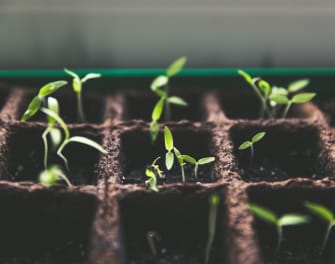We know what you’re thinking. Will winter ever end? You want to start your garden! We have good news my friends, you have our official Decker’s Nursery approval to start immediately. Even if you still have snow on the ground, it’s not too early to start.

Stay with us and in this multi-part series, we will coach you through a successful gardening season that leaves you with beautiful visits from energetic hummingbirds, plump vegetables and compliments from your neighbors.
Starting your seedlings
Mother Nature wasn’t quite done with us as we saw some snow in late March. Conventional wisdom says that you should wait until the soil thaws before you can start that garden. Not true!
We can start those seedlings right now inside your home. All you need is a location with at least 6 hours of sunlight, Espoma organic seed starter, a container, seeds, water and some patience. We have all of these supplies in stock at the nursery.
So what vegetables can you plant? We are fortunate here in the northeast because just about any vegetable variety will grow here. With proper planning you can have a lush garden full of spinach, lettuce, tomatoes, peppers, peas, kale and others.
As a general rule, we recommend burying seeds at a depth of two times the width of the seed. For example, if you have a seed that's about 1/16 inch thick, it should be planted about 1/8 inch deep. Larger seeds like beans can be up to a ½ inch wide. These can be planted an inch deep.
Conrads Pro Tip: Not all seeds are the same. Seed packages should be clearly marked “organic” or “Non-GMO”. They may cost a bit more, but the cost is negligible and eating healthy is part of the gardening fun. It’s what we plant in our own gardens. Different seed brands make a difference in your yields. Consistently year after year, we see the best results from Hart Seeds
In about 4 to 6 weeks, your sprouting vegetables will be well on their way and ready to be transported outdoors to their permanent location. Starting the growing season early in your home is rewarding and it saves money too. Small 6-12 seedlings can be purchased for about $14, while more mature plants are $4-7 each.
Prepping the soil
When it comes time to prep your soil, you can start as early as you like. Even if the ground is frozen, it’s likely only the first few inches as it’s late in winter season now and spring is around the corner. For most recreational gardeners, simple hand tools work best. Till the soil and take a good look at what your starting point is. We do recommend enriching your soil with a product we stock called Dr. Earth Vegetable and Garden soil. Also, mix in some lime to adjust the pH to move closer to alkaline conditions.
The reason you want to pay attention to your pH levels is because it will determine how your plants absorb nutrients like nitrogen and iron. The ideal range is from 6.0 to 7.5, but don’t worry about getting it exact because that’s a pretty wide range for your vegetables to do just fine.
Ask any successful gardener what their secret is and most of the time, they will tell you it’s compost. Simply put, it’s organic material. Some of our customers make it themselves by keeping grass clippings, kitchen waste, coffee grounds, eggshells and just about anything else that is natural. If that sounds like too much work or mess, you can just pick up a bag from us. Ultimately, you want about 5% of this organic matter in the soil. Starting with a good foundation could reduce or eliminate potential problems down the road. It will give your plants the best chance to thrive and grow to full maturity.
One common question we get from some of our regulars is, “Do you need to rotate the location of your plants for the next season?” We have seen no evidence that this is helpful to the recreational gardener. However, it can do no harm if you do. It just doesn’t seem to matter as long as you prepare the soil with compost.
We’re looking forward to a productive season. Feel free to give us a call if you have any specific questions about what you read here. Our associates are true experts and are dedicated to helping you grow the very best vegetables on your block.
Stay tuned for our next installment when we talk about transporting your seedlings and protecting them from critters.
